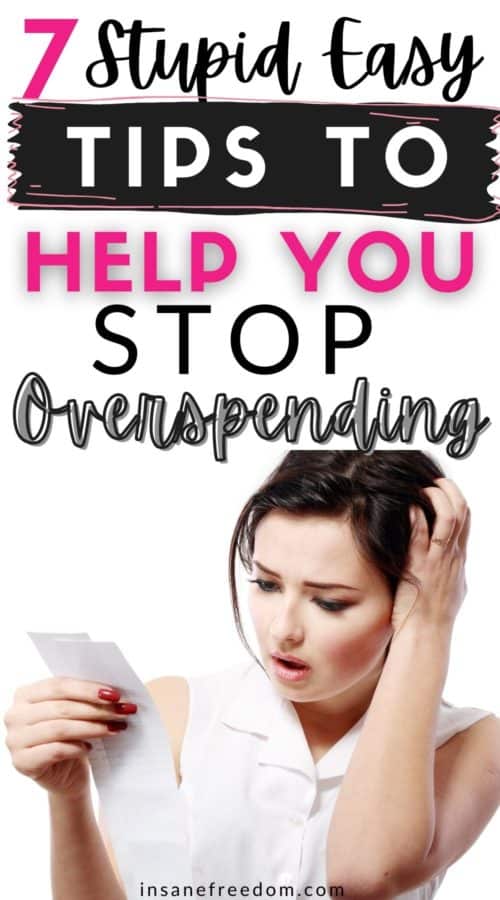For these people, living on the edge of their pay check is normal. They don’t know anything else. If this is you, learning how to stop overspending when it’s all you know is the only way to get your finances under control.
Overspending can cause more than an empty bank account. If it is taken too far, it can literally bankrupt a family. This is why it is vital to stop overspending before it becomes a problem too big to handle.
How to Control Your Spending
Contents

The first thing you will need to do to control overspending is finding exactly where you are overspending. If you aren’t sure where the money is going, you can’t stop it from going there. The first thing you should do is gather your bank statements for the past three months.
After you have the statements in front of you, use a highlighter to go through each one with a fine-tooth comb. Highlight anything that is spent on a non-necessary expense. This can include things like “fun” shopping, games, restaurants, and so on.
Once you have gone through all three months’ worth of bank statements, take some time to total up the dollar amounts of the money you wasted over those twelve weeks. It is probably pretty shocking. If the number bothers you or is more than your cost of living, you have a spending problem.
You might want to read: How To Avoid FOMO Spending And Start Saving Money
7 Simple Tips to Help You Stop Overspending Money

Now that you know you have an overspending problem, you can take the necessary steps to stop overspending.
To be successful at this, you will need to be honest with yourself that this particular habit is not an easy one to break. You and your family have gotten used to spending what you want when you want, and as such, you will likely have an uphill battle in changing things.
1) Have a Family Meeting
In an ideal world, you would be able to fix your family’s financial issues by yourself, but the harsh truth is that you cannot. You will need the cooperation of every member of your family. Yes, older children and teens included if you have them. Your best option is to sit your family down and explain to them. They should know what the issue is and that you will be reducing spending to fix things. Hopefully, they will support the idea and help you along your journey.
2) Understand Want vs. Need

The biggest reason people overspend is the lack of understanding about what expenses are genuine needs versus those that are wants. When there is confusion between the two, you are far more likely to spend money on a want. This likelihood drastically increases the amount of overspending your family does.
To put it simply, you have very few needs in your life. They are:
- Housing and Utility Bills
- Food
- Clothing
- Transportation costs
- Employment-related expenses
- School and Childcare expenses
- Medical and prescription costs
Anything above and beyond this shortlist should be considered a want. For example, your daily coffee takeaway, a coffee and cake with friends, a new coat or eating out.
3) Reset Your Budget
You’re on the right page now as far as knowing how much money you are overspending and understanding your needs. Now is the time to reset your budget. If you don’t have a budget or haven’t been keeping it updated, now is the time to do that as well.
If you are new to budgeting, keeping things simple is the best option. A simple budget will cover only your income and expenses, leaving the rest open to you. The simplest method is to list your income, followed by listing your expenditures. Subtract your expenses from your pay, and this is the amount of money you should have leftover at the end of each month. If the amount is negative, you have more expenses than income.
When you complete your new budget, it can be helpful to use a budget printable to help keep yourself on track.
Suggested reading: 6 Effective Tips to Learn How to Live on $1,000 a Month
4) Stay Aware of Your Spending

Even after you have a new budget created, it will still be incredibly easy to find yourself off track. This happens because you get comfortable, and when you find that level of comfort, it becomes easier to justify the overspending that brought you here in the first place. However, if you are always aware of yourself and how much money you are spending, you are less likely to slip into that comfort zone.
How you keep yourself aware should be entirely up to you. This is because what works to keep someone else aware may not work well for you. Only you can decide what method or type of action will keep your spending at the forefront of your mind. This could be using cash, locking your debit card when not in use, not shopping online, or any other action that helps you stop overspending.
5) Track Spending
As you get used to spending less, you will want to ensure you are tracking every penny you spend. This probably seems as if it is too tedious to do. However, it is the only way to know for sure if you are overspending or not. A very simple way to keep track of things is a nightly balance.
To do this, you will need an account ledger book. At the start of the book, add the balance of all bank accounts you own. Do not include investment or specialized accounts such as your emergency fund. Every night, sit down and add any income or expenses you had that day. This will help you keep a running balance and allow you to see if you are overspending, all at a moment’s glance, and hopefully, it will help reduce your spending simply because you can see it.
If you are tech savvy and would like the help of financial apps to help you track your spending, consider using apps like Trim. Trim is an app available for both Android and iPhone that is really useful for those who spend on impulse. That is because Trim negotiates your bills for you, as well as provide financial coaching, help you with budgeting and automate your credit card payments.
Read this honest review of the Trim app here to find out more.
6) No Spend Challenge
Another great way to help you stop overspending is by doing a no spend challenge! One of the more creative and fun ways to curb your spending habits, a no spend challenge also eventually reminds you of your core values i.e. the things that are most important to you.
Essentially, when you are doing a no spend challenge, you intentionally “ban” yourself from spending money on certain things. For example, if I am doing a no spend challenge this week where I am not allowed to buy any coffee takeaways, that means I can spend money as usual EXCEPT for takeaway lattes or iced mocha. Basically, cutting out something in the “want” category that is not essential to your daily living or survival is key.
In my personal experience, relying on my own will power to just spend less or spend within $200 in a week is less successful than when I do a no spend challenge. The simplicity of cutting out just ONE unnecessary expense helps me stay focused on my budget. That’s the beauty of a no spend challenge!
Start your no spend challenge today with this free printable to track your progress.
7) Only spend money you already have
Most of us rely on credit cards to stay on top of bills, rent, payments and unforeseen expenses. However, doing so also exposes you to the risk of living pay check to pay check and overspending. With retailers and businesses now accepting payments via Buy Now Pay Later schemes, purchasing items we cannot really afford is a huge problem. That is why I always live by a simple rule: only spend money I already have.
I know it is really crazy, but I do not own a credit card. Ever since I moved to Australia in my early 20s, I have largely stuck to using debit cards and cash. I must say, doing so might sound completely radical to you, but it has helped me live debt-free for almost a decade.
Conclusion
As you can see, learning to stop overspending requires a few simple steps and is completely achievable. The question is whether you are willing to make some lifestyle changes to improve your spending habits. Ultimately, your success lies in your underlying reason for doing this. If you’re trying to stop overspending so that you can finally pay down debt, live debt free or become wealthy, congratulations! You are on the right path towards financial independence, and I am so happy to be on this journey with you 😉

